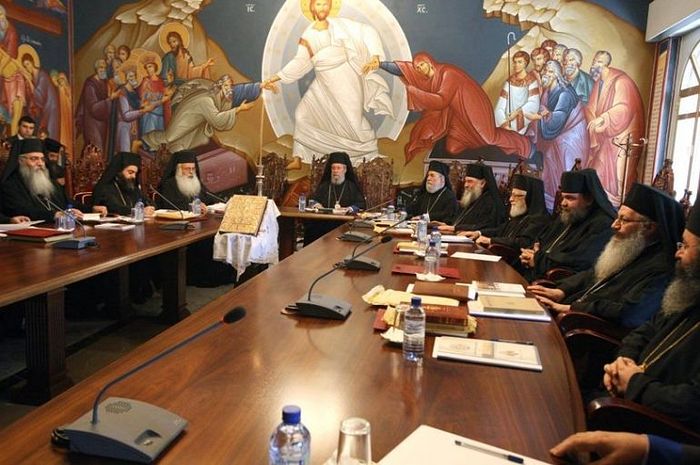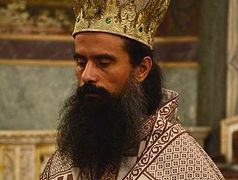Nicosia, Cyprus, February 19, 2019
An extraordinary session of the Holy Synod of the Church of Cyprus was held yesterday under the chairmanship of His Beatitude Archbishop Chrysostomos of Cyprus at which the issue of Constantinople’s creation of a new structure in Ukraine was discussed.
Abp. Chrysostomos made vague and seemingly conflicting statements earlier this year, which gave the Ukrainian schismatic church hope that the Cypriot Church would recognize them. In January, he said that while the Ukrainian people have the right to ask for autocephaly, they have not shown such a desire, and that he had not and would not commemorate the schismatic primate in the Divine Liturgy. He later said that the time would come when he would concelebrate with the schismatic primate, though at the Cypriot Church’s request and in the Cypriot Church’s timing.
The Synod’s new statement has been published on the official site of the Church of Cyprus. While the bishops agree that, as an independent nation, Ukraine has the right in principle to ask for autocephaly, and they do not question that the Patriarchate of Constantinople had the good intention of overcoming divisions in Ukraine, they nevertheless note that this has not yet happened, and that in any case, it needs to be explained how people without real ordinations can constitute a new church. Although the Synod does not explicitly condemn the Ukrainian schismatic church, they also do not recognize it.
Although “the Patriarchate of Constantinople’s intention in granting autocephaly to Ukraine was dictated by the desire for reconciliation and unity … this has not been achieved,” the bishops write. It is normal, they say, that such a process should take some time, but in the event that the desired unity does not manifest itself, then the Cypriot Synod expects the Patriarchate of Constantinople to hold a pan-Orthodox council or a Synaxis of the Primates to handle the issue.
Calls from around the Orthodox world have repeatedly been made for months for Patriarch Bartholomew to gather a pan-Orthodox council to address the Ukrainian issue but he has thus far rejected these calls. The unilateral nature of the creation of the new Ukrainian structure violates the conciliarity of the Orthodox Church and the agreements on how to grant autocephaly that have been made in recent years, many synods, primates, and hierarchs have noted.
A gathering of the Churches or primates should also deal with the ordinations, or lack thereof, of the clergy that make up the new church, as they came from two schismatic and unrecognized structures.
“The 2,000-year experience of the Church of Cyprus, and the entire Orthodox Church, gives us reason to doubt the possibility of retroactively recognizing consecrations celebrated by suspended, excommunicated, or anathematized bishops. The suspension, excommunication, and anathematization of several people who initiated the Ukrainian crisis were recognized by all Orthodox,” the bishops write.
In particular, Philaret Denisenko, the former canonical Metropolitan of Kiev and self-styled “Patriarch” of Kiev in the “Kiev Patriarchate” and the new structure, was suspended and excommunicated in 1992 and anathematized in 1997. These canonical sanctions were recognized by the entire Orthodox world, including Pat. Bartholomew himself, who wrote to His Holiness Patriarch Alexei II of Moscow and All Russia to recognize the sanctions and the Russian Church’s “exclusive competence” in dealing with Ukrainian matters.
Additionally, the consecrations of many of the “hierarchs” from the schismatic “Ukrainian Autocephalous Orthodox Church” trace back to Viktor Chekalin, who was never more than a deacon in the canonical Church, and who was recently arrested in Australia for fraud, forgery, and child molestation.
The Church of Cyprus also reiterated the offer previously made by Abp. Chyrostomos to act as a mediator in the dispute. “The Cypriot Church is at the disposal of all those interested in the reconciliation of the Church, which the Lord hath purchased with His own blood,” the statement reads.
The Synod also criticizes the fact that four Local Churches—Antiochian, Bulgarian, Georgian, and Russian—did not attend the Crete Council, “without any real reason,” thereby casting the sincerity of the relations between the Churches into doubt.
It is unclear why the bishops would formulate the argument this way, as each of the four Churches clearly expressed their reasons for not going to Crete. It is unclear why the Cypriot bishops uncritically trust Constantinople's intentions in Ukraine, but doubt the statements from each of these four Churches explaining why they did not go to Crete.
The Synod also criticizes the practice of breaking communion between Churches due to inter-Church disputes, as the Russian Church has done in the current context. The Cypriot bishops also recall that the Antiochian and Jerusalem Churches are currently out of communion, and that Constantinople has broken communion with Athens and Jerusalem in recent years. “When so many temptations and scandals afflict our faithful, we, as the ecclesiastical leadership, give them a poor example,” the statement reads.
The ancient connection between what are today the Russian and Ukrainian people and lands must also be considered. The bishops write: “Taking into account the sensitivities of the Russian people concerning the land in which their forebears were baptized, it must be ensured that their relevant jurisdiction be maintained there.”
If all parties involved would honestly conform to the rules and norms of the Church, the Ukrainian issue would be resolved, the Cypriot bishops write.
Follow us on Facebook!




